Brougher: Five men working for BBC died in 1971 IRA landmine
- Published
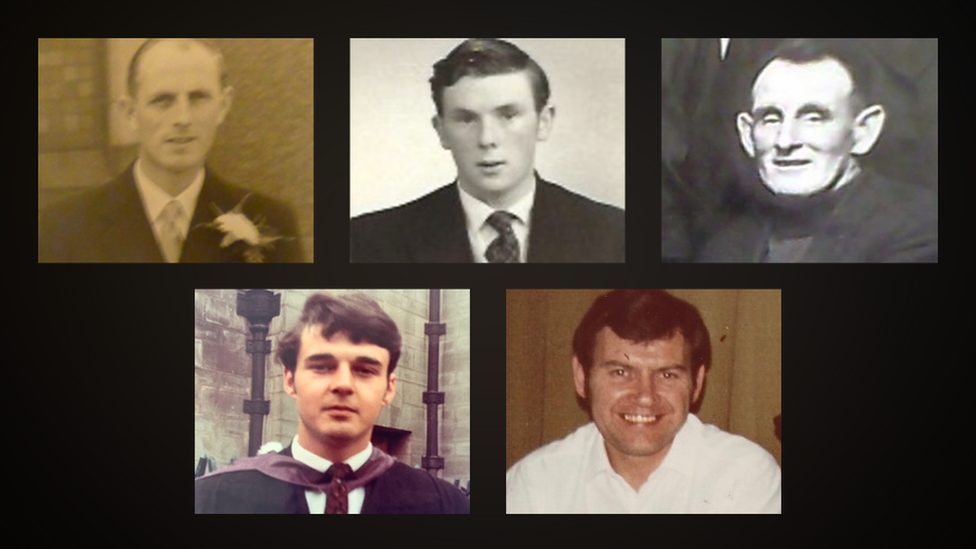
The victims were (clockwise from top left) George Beck, Harry Edgar, John Eakins, Bill Thomas and Malcolm Henson
On 9 February 1971, five men working for the BBC were killed by an IRA landmine as they drove up a mountain to repair a transmitter.
It happened on Brougher Mountain on the border between Fermanagh and Tyrone.
It is believed the booby-trap device at the road was meant for an Army patrol and was triggered by a tripwire.
The Impartial Reporter newspaper called it "the most savage and callous outrage ever committed by terrorists in either County Fermanagh or Tyrone".
Local journalist Mervyn Dane described "a saddening, grim scene on which the afternoon sun shone down and there was the acrid pungent smell of burning and explosives hanging over all".
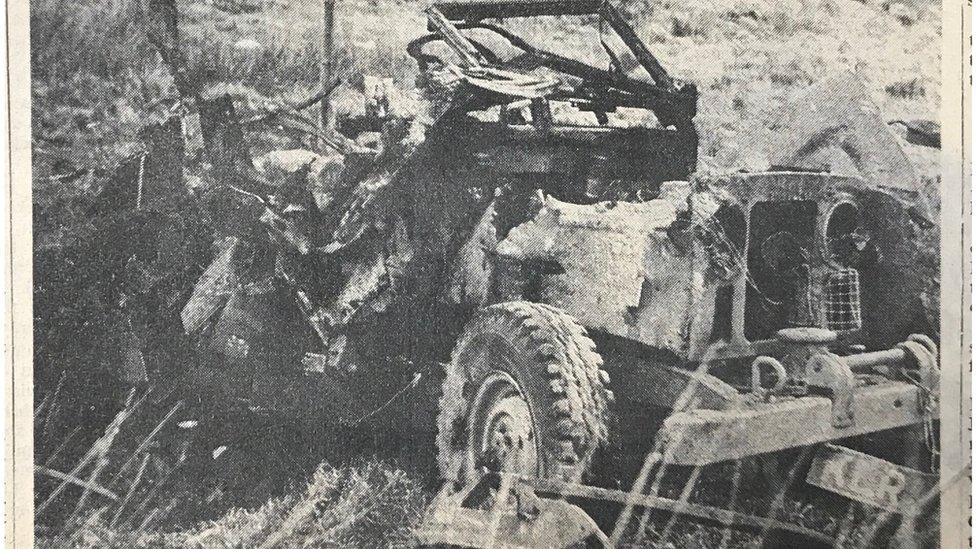
A Land Rover owned by the BBC was destroyed in the attack
"Even the hard-bitten, much travelled war-scarred daily newspaper reporters and cameramen were tight-lipped and silent as they surveyed the havoc wrought by the early morning explosion and the sudden death," he wrote.
At the time, it was the biggest single loss of life in what became known as the Troubles but, sadly, it was to be overshadowed by many more atrocities.
Two of the men who were killed were BBC engineers Bill Thomas, a 35-year-old father of two, and Malcolm Henson, who was 24 years old.
They had picked up three workmen, who travelled each day from Kilkeel, County Down, to drive the last few miles up the mountain in the BBC Land Rover.
John Eakins, 52, was married with seven young children; Harry Edgar was 26 and George Beck, 43, had two children.
They worked for a local building firm McMullen and Sons, which had a contract to carry out maintenance and repairs on the BBC's rural transmitter stations.
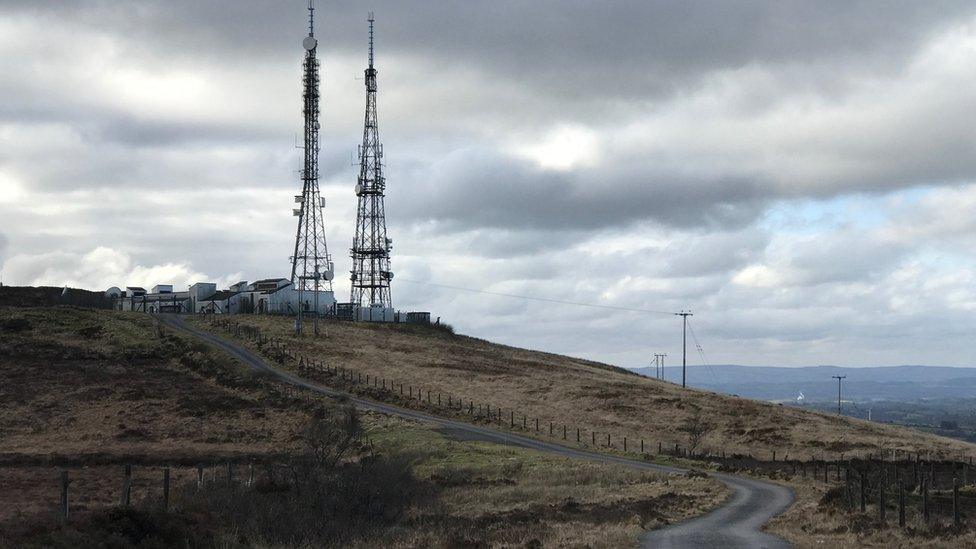
The scene at Brougher Mountain 50 years on
Mr Eakins' son Rodney, who was 12 years old when his father was killed, told BBC News NI: "I can remember it as if it was yesterday.
"They all had their day's work to do, it wasn't that they had a choice.
"If they wanted to keep a family alive, if they wanted to earn money, they had to go out and do it.
"Unlike those who left that explosive device - they had a choice, they chose to take life, not to preserve it."
He said the loss of life is "always there".
"It's something in Kilkeel that, well, it will never go away sadly."
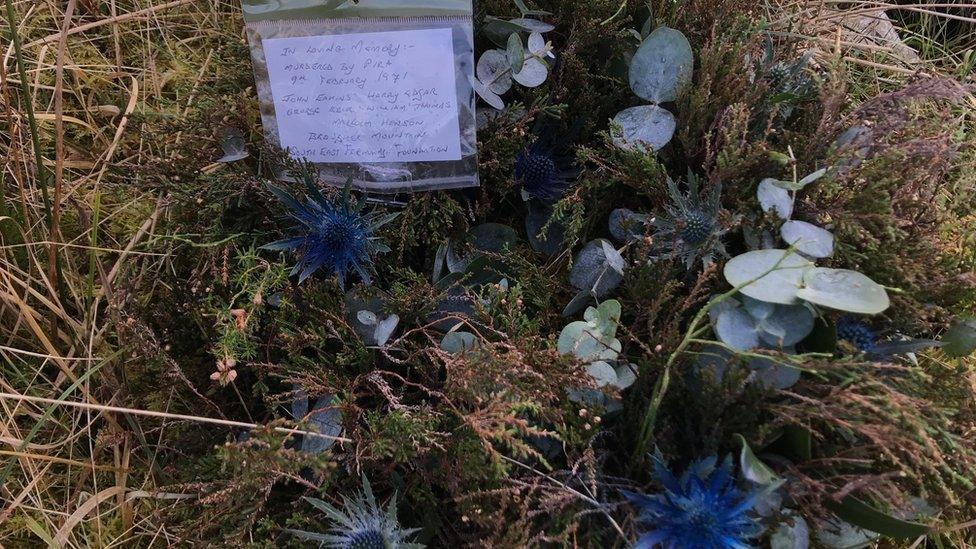
Flowers mark the scene of the explosion 50 years on
Malcolm Henson's sister Anthea said it had been his "dream job" to be an engineer with the BBC and he had been making plans to get married.
For many years their father made a pilgrimage to Brougher Mountain on 9 February to play a lament on his bagpipes called The Lakeland Hills which he had composed himself.
On his first visit a few weeks after his son had been killed, Leonard Henson said: "I feel no bitterness towards anyone, just sadness."
He picked a tuft of heather to take back home and plant in his garden.
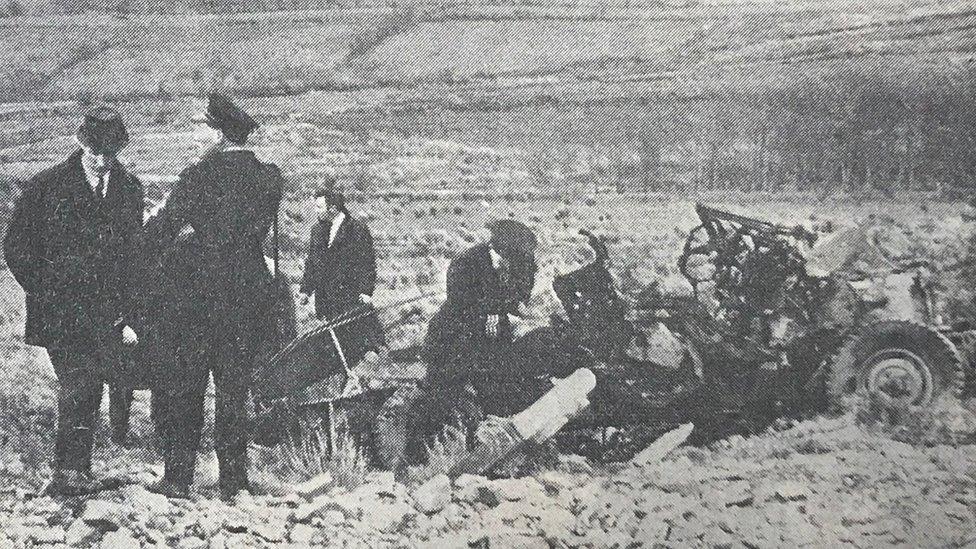
RUC officers at the scene of the 1971 explosion
Bill Thomas was killed just before his daughter Karen's 10th birthday.
She remembers going for picnics at weekends with her sister in the BBC Land Rover.
"That was great fun because in those days you were allowed to sit on his lap while he drove and steer the steering wheel," she said.
After her father's death, the family moved back to Wales but she said: "We have very fond memories of Northern Ireland.
"We hold no grudge, we have very fond memories of our childhood."
Despite a £50,000 reward for information, the killings on Brougher Mountain remain just some of the many unsolved murders of the Troubles.
Rodney Eakins accepts that no-one will ever be made accountable for what happened but he believes "you can't apportion blame for not bringing someone to justice".
He feels there are people "who would have known or had some knowledge of who did this and chose to be silent and that's a sad reflection of what goes on in our society here today".
The South East Fermanagh Foundation victims' group has arranged for a memorial to put up on the site of the killings.
Plans to unveil it on the 50th anniversary have been postponed but relatives say they are looking forward to travelling to Brougher Mountain later this year.